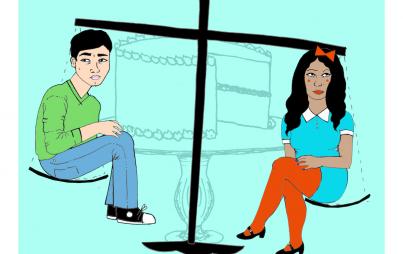
Photo by Annie Spratt on Unsplash
This article first appeared on Your Tango and has been republished with permission.
In researching my book The Indestructible Relationship, I interviewed dozens of couples who had suffered through illness and trauma. I compared the couples who made it through their hard times to couples who got a divorce after experiencing something traumatic.
My relationship advice? It takes specific skills to keep your relationship alive during illness, injury or any stressful experience. It doesn't matter whether you're the one who is injured or ill or you're a caregiver for your spouse or significant other. Either way, it can put strain on your partnership.
Even if you have the world's strongest bond, when you go through something traumatic, life after the incident isn't going to be the same. And that's when you need to figure out how to save a relationship. Because you're playing by new rules, and you're seeing your romantic partner in a whole new light. And some couples are compatible in every way except for the way they handle stress.
Strong couples shared with me dozens of skills you can use to keep your relationship strong during times of injury, illness, and stress. Here are five of those skills you'll need if you want to illness-proof and stress-proof your relationship.
1. Start doing things alone.
Resilient couples know that it's important NOT to sacrifice their social life when their romantic partner is ill. If you're a caregiver for your ill or injured husband or boyfriend, and you decide to always stay home to watch over him, you may start to resent him for keeping you away from the activities you love.
You might feel guilty for having fun without him. But for the sake of your own mental health, go out with your friends or take a walk in the park. If you want to attend a play or festival but can't find any friends to go with you, attend it alone. Your romantic partner should be happy you're getting away and taking time for yourself.
2. Be more flexible.
Let's say deep down inside you've always expected your man to be the primary breadwinner. If your husband is injured or has cancer and can no longer work or take care of you, you may find yourself resenting having to work extra hours to help pay the bills.
From the male perspective, a man who weighs his self-worth on his ability to provide for the family will be devastated if an illness prevents him from going to work. He might even resent his wife when she is forced to become the chief breadwinner in the family.
If you want your relationship to survive this role reversal, become a human rubber band by doing things differently. If you always take a left when you leave your house to take a walk, today turn right. Alternate the streets you walk on every day. If Merlot is your usual choice of wine with dinner, tonight try Chardonnay.
Do things differently and you'll become more flexible. And flexibility is the key to keeping your relationship alive when things don't go the way you expect.
You Might Also Like: I’m Diabetic, And Sometimes I Don’t Care
3. Remember that you both own the illness, injury, or stress.
It's easy when you're sick to feel sorry for yourself. But remember: as your caregiver, your significant other or spouse is also under a lot of stress. It's just as hard on him as it is on you.
In The Indestructible Relationship, I tell the moving story of Wayne, who was paralyzed in a football accident a month after his wedding to Barb. They've been together 40 years now. But if they hadn't solved one of their biggest relationship challenges after Wayne's accident, their story might not have had a happy ending. At first, Wayne didn't notice Barb's feelings, her exhaustion, the fact his accident also burdened her.
The scene usually played itself out like this: the moment Barb sat down, Wayne looked at his wife. "I'm thirsty. I need a glass of water." Sighing, Barb stood up once again, retrieved the water from the kitchen and brought it to her husband. The moment she settled herself into the couch, Wayne presented her with another request.
"I was up and down like a yo-yo," said Barb. It wasn't until Wayne learned to stockpile his requests and present them to her all at one time that the couple's stress subsided.
4. Seek support outside of the relationship.
I'm not talking about having an affair. But let's say you have cancer or another chronic illness or you've been injured at work. You try to talk to your husband or boyfriend about what you're going through and he just doesn't understand. Or if you have breast cancer, maybe he's so afraid of you dying that when you try to talk to him about your own fear of dying, he simply can't go there.
Instead of getting frustrated, seek support elsewhere. Talk to a friend. Write in a journal. Join a support group and/or a Facebook group of people who are going through the same thing you are.
5. Re-adapt when you're back in the game.
Let's say your husband took over a lot of the child-rearing responsibilities while you were going through chemotherapy and radiation. He helped them with their homework. Picked them up from school. Cooked dinner.
When you heal and are ready to resume your previous involvement in your kids' lives, your husband may not remember how to share the child-rearing responsibility. In some cases, a man in this situation may even resent his wife's attempts to include herself in the established routine and her making decisions about the kids' lives she hasn't been making in months.
To prevent this from happening, allow your hubby to continue to perform some of the child-rearing tasks he took over while you were out of commission, even if these were your responsibilities before the cancer.
These five ways to learn how to save a relationship and keep it illness-proof are only a start. My research revealed there are dozens more specific skills that resilient couples use to make their lives easier — and their relationships stronger — during difficult times.
But by practicing these five skills when one of you is injured, ill, or even experiencing something stressful like being out of work, there's a better chance that while your body may not be healthy, your relationship definitely will be.








